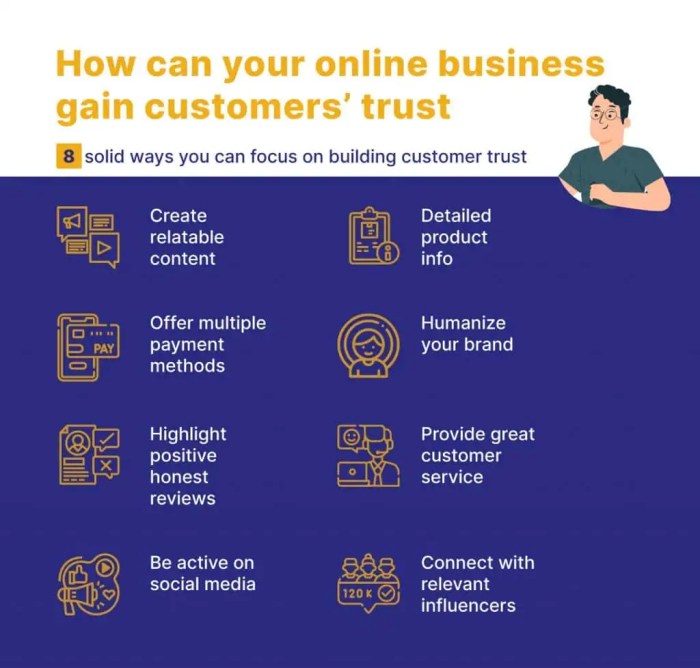Building Customer Trust Online sets the stage for businesses to thrive in the digital realm, exploring the essential strategies and impact on brand success. Get ready to dive into a world of online trust-building like never before!
In today’s digital age, establishing trust with customers online is more vital than ever. It can make or break a business’s reputation and influence long-term relationships with consumers. This guide will walk you through the key strategies for cultivating trust and leveraging it to achieve business growth.
Importance of Building Customer Trust Online
Building customer trust online is crucial for businesses to establish credibility, loyalty, and long-term success in the digital marketplace. Trust is the foundation of any customer-business relationship, and it plays a significant role in shaping consumer perceptions and purchasing decisions.
Impact on Online Sales and Brand Reputation
When customers trust a brand or company, they are more likely to make repeat purchases and recommend the business to others. Positive online reviews, testimonials, and ratings can significantly influence potential customers to choose one brand over another. On the other hand, a lack of trust can lead to negative reviews, decreased sales, and damage to the brand’s reputation.
Role in Fostering Long-Term Customer Relationships
Building trust online is essential for fostering long-term relationships with customers. When customers trust a business, they are more likely to engage with the brand, provide feedback, and remain loyal over time. Trust also creates a sense of security and reliability, which encourages customers to continue doing business with a company they trust.
Strategies for Building Customer Trust Online

Building customer trust online is crucial for the success of any business. By implementing key strategies such as transparent communication, consistent branding, and social proof, companies can establish a solid reputation and foster long-lasting relationships with their customers.
Transparent Communication
Transparent communication is essential in building trust with customers. By providing clear and honest information about products, services, and policies, businesses can demonstrate their credibility and integrity. This includes being upfront about pricing, shipping times, and any potential issues that may arise. When customers feel that a company is being open and honest with them, they are more likely to trust and continue doing business with that company.
Consistent Branding
Consistent branding helps to create a sense of reliability and professionalism. By maintaining a cohesive brand image across all channels, including social media, website, and marketing materials, businesses can establish a strong and recognizable presence in the minds of consumers. This consistency reassures customers that they are dealing with a reputable and trustworthy company.
Excellent Customer Service
Providing excellent customer service is key to building trust online. By responding promptly to inquiries, addressing concerns, and resolving issues in a timely manner, businesses can show customers that their satisfaction is a top priority. Positive interactions with customer service representatives can greatly enhance a customer’s overall perception of a company and increase their trust in the brand.
User-Generated Content
User-generated content, such as reviews, testimonials, and social media posts, can significantly boost a company’s credibility and trustworthiness. When potential customers see positive feedback from real users, they are more likely to trust the brand and make a purchase. Encouraging customers to share their experiences and opinions can help create a sense of community and authenticity around a brand, ultimately building trust and loyalty among consumers.
Building Trust through Website Design
Building trust through website design is crucial in gaining the confidence of online customers. The design elements of a website can significantly impact a customer’s perception of trustworthiness.
Trust Signals on a Website
- Security Badges: Displaying security badges from trusted sources like Norton Secured or McAfee Secure can reassure customers that their information is safe on your site.
- Customer Testimonials: Including honest testimonials from satisfied customers can build credibility and trust with potential buyers.
User-Friendly Navigation and Clear Messaging
User-friendly navigation and clear messaging are essential in creating a positive user experience and establishing trust with visitors.
- Easy Navigation: A well-organized site with intuitive navigation helps users find what they are looking for quickly and easily, leading to a more positive perception of your brand.
- Clear Messaging: Clearly communicating your products or services, as well as your company values, can help customers understand what you offer and why they should trust your brand.
Leveraging Social Media for Customer Trust

In today’s digital age, social media has become a powerful tool for businesses to connect with their customers and build trust. By leveraging social media platforms effectively, businesses can create a transparent and authentic relationship with their audience, ultimately leading to increased customer trust and loyalty.
Engaging Authentically with Followers, Building Customer Trust Online
- Respond promptly to comments and messages: Engaging with your followers in a timely manner shows that you value their feedback and are committed to addressing their concerns.
- Showcase behind-the-scenes content: Giving your audience a glimpse into your business operations humanizes your brand and fosters a sense of trust.
- Create interactive polls and Q&A sessions: Encouraging two-way communication through polls and Q&A sessions helps in building a strong relationship with your followers.
Addressing Customer Feedback and Concerns
- Listen actively: Pay attention to what your customers are saying on social media and take their feedback seriously.
- Respond empathetically: Show empathy towards customers who express concerns or complaints, and work towards resolving their issues promptly.
- Take feedback into consideration: Use customer feedback as constructive criticism to improve your products or services, showing customers that their opinions matter.





